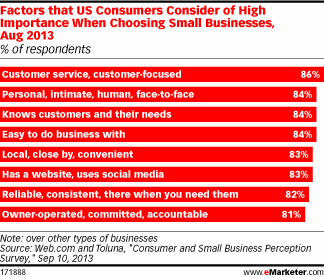
A recent post in eMarketer featured the results of two studies that inspired me to finally write about a topic which has been bothering me for a while now: at a time when consumers are making the shift to digital at an alarming rate, too many small businesses are operating websites that serve as an unnecessary novelty rather than an indispensable utility. Over time, this will create increasingly dire consequences for these small businesses.

Many Consumers Prefer Small Businesses
In April of this year, AYTM Market Research released data outlining various reasons why US Internet users prefer small businesses over larger companies. The number two answer cited, just behind supporting the local economy (56.2%), was the level of personal service (52.7%) provided by small businesses. The study also found that 61.2% of respondents said they would even pay higher prices to support small businesses.
Data from an August 2013 US consumer survey conducted by Toluna and Web.com underscore the AYTM findings. When asked what factors are considered of high importance when choosing small businesses, 86% of respondents said customer service/customer focus. The following graphic from eMarketer outlines some other key factors:

Scanning through the factors listed above, it strikes me that virtually every one of these can and should be reflected in a company’s website and social media presence—the two core assets which come together to form its online brand. Underscoring this point, 83% of survey respondents listed “has a website, uses social media” as a factor of high importance when choosing small businesses.
Many Small Business Websites Are Coming Up Short
Unfortunately, in the case of the business website, expectation does not always align with reality. According to statistics from E-Marketer, Barlow Researchers, U.S. Census Bureau, Jupiter Research, only 53% of US small businesses even have a website in 2014; by contrast, fully 45% of small businesses did in 2009—not a great leap forward in adoption by any stretch of the imagination.
Moreover, of those small businesses currently finding themselves without a website, the number one reason cited for not having one is, “our business currently does not need one.” This is not surprising to me. Of the roughly 28 million small businesses in the US (i.e. businesses with fewer than 500 EEs) 22 million are self- employed with no additional payroll or employees.
The majority of small businesses, then, are tiny operations comprised of one or perhaps a few persons running all aspects of the operation. Many who fall into this category probably lack the time to set up and manage a website and social media presence or to vet a marketing team to do so for them, while some may not feel they have the money to expend on such novelties; others likely have found success without a website or social media. I’d be willing to bet that for many, the combination of a lack of resources and/or the perception of a lack of need fuels the decision to forgo a business website.
According to the research of E-Marketer et al., of those small businesses that do have a website, many suffer from limited functionality: 80% offer general information, 45% provide customer service, 30% have lead capture capabilities, while only 13% post a blog. From this data I’ll go out on a limb and infer that, even where they exist, many small business websites are more of a novelty than a functional utility, for both the brand and its customers.
This of course is an unsustainable irony for small businesses: an economic segment with the greatest reliance on functional utility to survive, and who can least afford to expend time and resources on unnecessary novelties.
I suppose it’s not surprising. We humans – and by extension the businesses we run – often embrace the novelty of a new technology before we fully recognize and internalize its functional utility. Think of the railroad and automobile for shipping, the fax machine and the mobile phone for communication, the PDA and computer for business management, the list goes on. It’s almost as if thinking of a new technology as a novelty is a precondition to implementing it as a tool in daily business.
One only need examine the definition of the two words side by side to understand why this may be the case:
- Novelty: the quality of being new, original, or unusual.
- Utility: the state of being useful, profitable, or beneficial.
From Novelty to Utility
As much as small business owners like to style themselves as devil-may-care entrepreneurs, like investors in the stock market, most business owners crave stability, predictability, and practicality. On the flip side, they tend to cast a dubious eye at the new, the unknown, the untested – the novel. Only when a new business solution proves itself over the test of time can it be trusted as a functional utility.
Unfortunately, things are moving exponentially rather than linearly in today’s integrated digital economy. Consumer adoption of social, mobile and internet technologies is covering a wider breadth and moving at a much greater speed than conventional wisdom had predicted, overturning or redefining many aspects of business orthodoxy in favor of other ideas and paradigms.
In this new digital orthodoxy, the website has shifted from unnecessary novelty to indispensable utility for small businesses. Serving as the brand’s virtual storefront in the digital world, the website is the anchor of its online presence. In many cases, it is the first (and in some cases, only) exposure a prospective customer is going to have to the brand. Given this, it shouldn’t offer consumers mere novelty; it should provide them functional utility.
Recalling the factors cited earlier in this post that US consumers consider of high importance when choosing a small business, most are looking for a customer-centric experience where they feel a genuine, personal (human) connection with the company with whom they do business; they want to feel like the brand is receptive to and understanding of their needs; they favor brands that are easy to work with and convenient to access; finally, they want to do business with brands that are reliable, consistent, and accountable.
As an erstwhile small business owner and longtime small business supporter, it all makes perfect sense. The sentiments are universal: when you stop and think about the factors that are most important to you, the traits you look for in the companies you prefer to do business with, I’d be willing to bet many, if not all, of them make your list too.
So what are you waiting for? If you’re a small business owner who has put off committing to a website, the time has come to build one. If you have a website that is operating more like a novelty than a utility, the time has come for a redesign. In either case, make sure all of the above-mentioned factors are taken into account and reflected in your new website.
Better get cracking; in the eyes of the consumer, the business website has matured from an unnecessary novelty to a practical utility. They see it. Do you?
This article was originally published by SyneCore
Published: May 13, 2014
3763 Views
3763 Views












